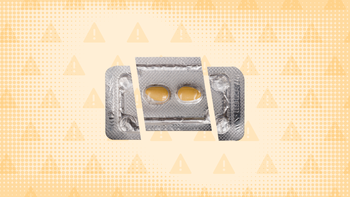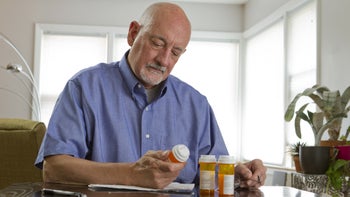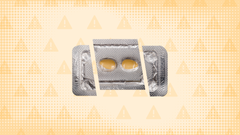tadalafil
Tadalafil (Cialis) is used for erectile dysfunction (ED) and benign prostatic hyperplasia (BPH) in adults. It belongs to the drug class called phosphodiesterase 5 (PDE-5) inhibitors. Tadalafil (Cialis) is a tablet you take by mouth. For ED, you can take a dose either just before sex or once every day. And for BPH, it's taken once a day. Side effects include headache and indigestion. Tadalafil (Cialis) can interact with many medications, including blood pressure medications. Some drug interactions can lead to very low blood pressure and dizziness. Tadalafil (Cialis) is available as a brand-name and generic version.

What is Tadalafil (Cialis)?
What is Tadalafil (Cialis) used for?
How Tadalafil (Cialis) works
Tadalafil (Cialis) is a phosphodiesterase-5 (PDE-5) inhibitor. It works by blocking a protein in the body called PDE-5.
For ED, blocking PDE-5 causes the muscles in the penis to relax. This allows the penis to fill with blood when you're sexually aroused. It helps you have an erection and maintain an erection.
For BPH, it's not fully clear how the medication works to help treat symptoms. But researchers think it helps relax the muscles in the prostate (a small gland in the groin).
Drug Facts
More on Tadalafil (Cialis) essentials

Get your GoodRx coupon

What are the side effects of Tadalafil (Cialis)?
Common Side Effects
- Headache (11-15%)
- Indigestion (4-10%)
- Back pain (3-6%)
- Headache (3-6%)
- Indigestion (4-5%)
- Common cold symptoms (3-4%)
- Back pain (3%)
- Upper respiratory tract infection (3%)
- Headache (2-4%)
- Indigestion (up to 2%)
- Common cold symptoms (2%)
- Back pain (1-2%)
Other Side Effects
- Muscle ache
- Flushing
- Pain in arm or leg
- Stuffy nose
Serious Side Effects
- Priapism: painful erection lasting for more than 4 hours
- Eye problems: vision loss, can't see as clearly, bloodshot eyes, burning feeling in the eye, eye swelling or pressure
- Dangerously low blood pressure: feeling faint, weak, or dizzy; blurry vision; racing heart; feeling confused
Source: DailyMed
More on Tadalafil (Cialis) side effects
The following side effects have also been reported
Along with its needed effects, a medicine may cause some unwanted effects. Although not all of these side effects may occur, if they do occur they may need medical attention.
Check with your doctor immediately if any of the following side effects occur:
Less common
Arm, back, or jaw pain
blurred vision
chest pain, discomfort, tightness, or heaviness
chills
cold sweats
confusion
dizziness
fainting
faintness or lightheadedness when getting up suddenly from a lying or sitting position
fast or irregular heartbeat
headache
hearing loss
increased erection
nervousness
pain or discomfort in the arms, jaw, back, or neck
pounding in the ears
slow or fast heartbeat
spontaneous penile erection
sweating
unusual tiredness or weakness
vomiting
Rare
Painful or prolonged erection of the penis
Incidence not known
Blindness
blistering, peeling, or loosening of the skin
cracks in the skin
decrease or change in vision
difficulty with speaking
double vision
fast, irregular, pounding, or racing heartbeat or pulse
headache, severe and throbbing
hives or welts, itching, skin rash
inability to move the arms, legs, or facial muscles
inability to speak
joint or muscle pain
loss of heat from the body
numbness or tingling of the face, hands, or feet
red skin lesions, often with a purple center
red, irritated eyes
red, swollen skin
redness of the skin
redness or soreness of the eyes
slow speech
sores, ulcers, or white spots in the mouth or on the lips
stomach pain
sudden cardiac death
swelling of the feet or lower legs
Some side effects may occur that usually do not need medical attention. These side effects may go away during treatment as your body adjusts to the medicine. Also, your health care professional may be able to tell you about ways to prevent or reduce some of these side effects. Check with your health care professional if any of the following side effects continue or are bothersome or if you have any questions about them:
Less common
Bloody nose
body aches or pain
burning, crawling, itching, numbness, prickling, "pins and needles", or tingling feelings
burning, dry, or itching eyes
burning feeling in the chest or stomach
congestion
difficulty with moving
difficulty with swallowing
dryness or soreness of the throat
excessive eye discharge
feeling of constant movement of self or surroundings
feeling of warmth, redness of the face, neck, arms and occasionally, upper chest
hoarseness
lack or loss of strength
loose stools
muscle aching, cramping, or stiffness
neck pain
pain in the arms or legs
pain or burning in the throat
redness, pain, swelling of the eye, eyelid, or inner lining of the eyelid
reduced sensitivity to touch
runny or stuffy nose
sensation of spinning
sleepiness or unusual drowsiness
stomach upset
swelling of the eyelids
swelling or puffiness of the eyes or face
swollen joints
tearing
tender, swollen glands in the neck
tenderness in the stomach area
trouble with sleeping
upper stomach pain
voice changes
watering of the eyes
Rare
Changes in color vision
Other side effects not listed may also occur in some patients. If you notice any other effects, check with your healthcare professional.
Call your doctor for medical advice about side effects. You may report side effects to the FDA at 1-800-FDA-1088.

Pros and cons of Tadalafil (Cialis)

Pros
A first-choice medication for ED
For ED only, can take either as needed or once daily
Lasts longer than other ED medications
Can treat ED and BPH at the same time

Cons
Can take up to 2 hours to get its full effect for ED
Can cause side effects like headache, stomach upset, and back pain
Not recommended if you've had a heart attack in the past 3 months, or a stroke or heart failure in the past 6 months
Can't take if you've recently taken nitrates like isosorbide mononitrate (Monoket) or nitroglycerin (Nitrostat)

Pharmacist tips for Tadalafil (Cialis)

You can take tadalafil (Cialis) with or without food. Food doesn't affect how well the medication works.
Swallow the tadalafil (Cialis) tablet whole. Don't cut them in half or split them. If you have trouble swallowing pills whole, talk to your prescriber about your options.
If you're taking tadalafil (Cialis) for ED as needed before sex: It's best to take the medication at least 30 minutes before you have sex. This gives the medication enough time to kick in. If this isn't convenient, ask your prescriber about your options.
If you're taking tadalafil (Cialis) once daily either for ED, BPH, or both: Take the medication at the same time every day. This can help make it part of your daily routine so you remember to take your medication. For ED, this can give you more freedom (no need to worry about timing when to take the medication before sex).
Don't take tadalafil (Cialis) more than once per day unless your prescriber told you to. This could lead to worse side effects like low blood pressure, dizziness, and vision problems.
Some people might feel muscle or back pain while taking tadalafil (Cialis). If this happens, it should get better within about 2 days. In the meantime, try placing a hot or cold compress where it hurts for some short-term relief. Reach out to your care team if the pain doesn't get better or go away.
Tell your prescribers and pharmacist that you're taking tadalafil (Cialis). Also share a list of your other medications with them. Tadalafil (Cialis) can interact with a lot of medications. Some include blood pressure medications and other BPH medications. It can make your blood pressure drop too low. Your care team can make sure your medications are safe to take together.
If you have an erection for more than 4 hours or a painful erection after taking tadalafil (Cialis), go to the emergency room right away. It it's left untreated, it could lead to damage to the penis.
Be sure to practice safe sex and use a condom. Tadalafil (Cialis) doesn't stop the spread of sexually transmitted infections (STIs).
More on Tadalafil (Cialis) tips

Frequently asked questions about Tadalafil (Cialis)

How to save using GoodRx




What are the risks and warnings for Tadalafil (Cialis)?
Tadalafil (Cialis) can cause some serious health issues. This risk may be even higher for certain groups. If this worries you, talk to your doctor or pharmacist about other options.

Risk of heart problems in people with heart disease
Risk factors: History of a heart condition | Heart attack in the past 3 months | Stroke in the past 6 months | Heart failure in the past 6 months | Uncontrolled heart rhythm problems (arrhythmia) | Uncontrolled high blood pressure | Low blood pressure | Have chest pain during sex
Before taking tadalafil (Cialis), tell your prescriber if you have any heart problems. Some heart problems can make people more sensitive to the effects of the medication. And, having sex can be risky for people with certain heart conditions. Tadalafil (Cialis) is sometimes used for having sex. Because of this, it might not be the best choice for people whose prescriber has told them not to have sex to be safe.
Tadalafil (Cialis) hasn't been studied in people who've had a recent heart attack, stroke, or heart failure. It also hasn't been studied in people with certain types of chest pain. If you have a heart problem, talk to your prescriber to find out if this medication is safe for you.

Low blood pressure
Risk factors: Medical conditions that make you more sensitive to blood pressure changes | Taking alpha blockers | Taking blood pressure medications | Taking medications for chest pain (angina) | Taking ritonavir (Norvir) | Drinking alcohol
Tadalafil (Cialis) can cause temporary low blood pressure. This usually doesn't cause problems. But it can for people with health conditions that are sensitive to changes in blood pressure.
Your blood pressure can also get too low if you take tadalafil (Cialis) with some medications. These include blood pressure medications. It also includes alpha blockers like tamsulosin (Flomax).
You should never take tadalafil (Cialis) when taking a nitrate medication for chest pain (angina). This combination can make your blood pressure drop dangerously low. If you have chest pain after taking tadalafil (Cialis), talk to your prescriber about safe options for relief.
Tell your prescriber about all your health problems and medications. They can check that tadalafil (Cialis) is safe for you to take. If you take this medication, be very careful getting up after sitting or lying down. This can help prevent you from feeling dizzy from low blood pressure and possibly falling.

Prolonged or painful erection (priapism)
Risk factors: Medical conditions that affect the penis | Sickle cell anemia | Multiple myeloma | Leukemia
It's rare, but some people who took medications like tadalafil (Cialis) have had an erection that lasted more than 4 hours (priapism). Sometimes, it can be painful. If it's not treated in time, it can lead to permanent damage to the penis.
Let your prescriber know about your medical conditions. You're at higher risk of priapism if you have other conditions affecting your penis. The risk could also be higher if you have sickle cell anemia, multiple myeloma, or leukemia.
If you have an erection that lasts longer than 4 hours or a painful erection, get medical help right away.

Vision changes
Risk factors: "Crowded" optic disc
If you suddenly notice changes in your vision in one or both of your eyes, go to the emergency room or call your prescriber right away. Although this is rare, tadalafil (Cialis) might raise the risk of eye damage. This can potentially lead to permanent vision loss.
Before starting tadalafil (Cialis), tell your prescriber about your full medical history. If your eye specialist has told you that you have a "crowded" optic disc, you might be at higher risk of vision changes with this medication. Your prescriber can decide if tadalafil (Cialis) is right for you based on the risks and benefits.

Hearing loss
Some people who took tadalafil (Cialis) had problems with hearing. Sometimes, this happened along with ringing in the ears (tinnitus) and dizziness. It's not clear if these problems are directly related to the medication. If you notice any changes in your hearing in one or both of your ears, stop taking tadalafil (Cialis) and call your prescriber right away.

Interactions with other medications
Risk factors: Taking nitrate medications | Taking blood pressure medications | Taking alpha blockers | Taking certain antifungals or antivirals
Tadalafil (Cialis) can interact with certain medications. These drug interactions can raise your risk of serious side effects, including dangerously low blood pressure.
Don't take tadalafil (Cialis) with nitrates. These include nitroglycerin (Nitrostat) and isosorbide dinitrate (Isordil). It can cause your blood pressure to drop too low. Tadalafil (Cialis) can also interact with blood pressure medications. Other drug interactions are with certain antifungals and antivirals like ritonavir (Norvir). Some interactions can raise the risk of other side effects like headaches and flushing.
It's important to tell your prescriber and pharmacist about all the medications you take and plan to take. Your care team can check that they're all safe to take together. They can adjust your medications or give you specific instructions on how to take them to keep you safe.

Tadalafil (Cialis) dosage forms
Typical dosing for Tadalafil (Cialis)
Erectile dysfunction (ED) only
When taken as needed: The typical starting dose is 10 mg by mouth at least 30 minutes before sexual activity. Take the medication only up to once per day, even if you have sex more than once in a day. Your prescriber will adjust your dose based on how well it's working for you and if you have side effects.
When taken daily: The typical starting dose is 2.5 mg by mouth at the same time every day, without regard to timing of sexual activity. Your prescriber will adjust the dose depending on how well it's working for you and any side effects.
Benign prostatic hyperplasia (BPH) only or BPH with ED
When taken daily: The typical dose is 5 mg by mouth at the same time every day.
Your dose might differ if you have liver or kidney problems. It also might be different if you take certain medications that interact with tadalafil (Cialis).
More on Tadalafil (Cialis) dosage forms

Tadalafil (Cialis) Reviews
GoodRx has partnered with PatientsLikeMe to provide reviews on the different aspects of Tadalafil (Cialis).
Effectiveness
Learn more about the effectiveness of Tadalafil (Cialis) based on real life experiences.
Overall Rating
Based on 34 people taking this medication
2.8
Effectiveness by condition:
erectile dysfunction22 reviews
4.3
urinary incontinence8 reviews
2.8
benign prostatic hyperplasia3 reviews
1.7
median arcuate ligament syndrome1 reviews
2.5
Severity of side effects
Based on 65 people taking this medication
0%
50%
100%
Top side effects
Headaches
8%
Sinus congestion
5%
Pain in lower back
5%
Chronic headaches
4%
Allergies
2%
Reasons people stopped taking Tadalafil (Cialis)
Based on 28 people who have taken this medication
Expense
25%
Other
25%
Did not seem to work
22%
Change in health plan coverage
11%
Side effects too severe
11%
Course of treatment ended
4%
Doctor's advice
4%
How long people take Tadalafil (Cialis)
Based on 80 people taking this medication
0%
50%
100%

Interactions between Tadalafil (Cialis) and other drugs
More on Tadalafil (Cialis) interactions
Using this medicine with any of the following medicines is not recommended. Your doctor may decide not to treat you with this medication or change some of the other medicines you take.
- Amyl Nitrite
- Boceprevir
- Erythrityl Tetranitrate
- Isosorbide Dinitrate
- Isosorbide Mononitrate
- Nitroglycerin
- Pentaerythritol Tetranitrate
- Propatyl Nitrate
- Riociguat
- Telaprevir
Using this medicine with any of the following medicines is usually not recommended, but may be required in some cases. If both medicines are prescribed together, your doctor may change the dose or how often you use one or both of the medicines.
- Alfuzosin
- Atazanavir
- Bunazosin
- Clarithromycin
- Cobicistat
- Darunavir
- Erythromycin
- Fosamprenavir
- Indinavir
- Itraconazole
- Ketoconazole
- Lopinavir
- Moxisylyte
- Nefazodone
- Phenoxybenzamine
- Phentolamine
- Prazosin
- Ritonavir
- Saquinavir
- Simeprevir
- Simvastatin
- Tamsulosin
- Telithromycin
- Terazosin
- Tipranavir
- Trimazosin
- Urapidil
Using this medicine with any of the following medicines may cause an increased risk of certain side effects, but using both drugs may be the best treatment for you. If both medicines are prescribed together, your doctor may change the dose or how often you use one or both of the medicines.

How much does Tadalafil (Cialis) cost?

Tadalafil (Cialis) contraindications
Taking a nitrate medication for chest pain (angina)
Taking guanylate cyclase (GC) stimulators, such as Adempas (riociguat)
History of allergic reaction to other tadalafil medications (for example, Adcirca)

What are alternatives to Tadalafil (Cialis)?

What is the latest news about Tadalafil (Cialis)?

Tadalafil (Cialis) images
Get savings updates for Tadalafil (Cialis)
Receive price alerts, news, and other messages from GoodRx about Tadalafil (Cialis) and other healthcare topics and relevant savings offers.By providing your email, you consent to receive marketing communications from GoodRx, which may include content and/or data related to men’s health, women's health, reproductive care, or sexual health. You agree to the GoodRx Terms of Use and acknowledge the Privacy Policy. You can unsubscribe at any time.
References
Best studies we foundAlembic Pharmaceuticals Inc. (2025). Tadalafil tablet, coated [package insert]. DailyMed.
American Heart Association. (2024). Sexual activity and heart disease.
Burnett, A. L., et al. (2018). Erectile dysfunction: AUA guideline. The Journal of Urology.
Hatzimouratidis, K. (2014). A review of the use of tadalafil in the treatment of benign prostatic hyperplasia in men with and without erectile dysfunction. Therapeutic Advances in Urology.
Levine, G. N., et al. (2012). Sexual activity and cardiovascular disease: A scientific statement from the American Heart Association. Circulation.
National Institute on Aging. (2024). Prostate problems.
Oelke, M., et al. (2015). Time to onset of clinically meaningful improvement with tadalafil 5 mg once daily for lower urinary tract symptoms secondary to benign prostatic hyperplasia: Analysis of data pooled from 4 pivotal, double-blind, placebo controlled studies. The Journal of Urology.
Somani, A. N., et al. (2025). Pseudopapilledema.
Compare other Erectile Dysfunction, Benign Prostatic Hyperplasia drugs
Browse medications
View AllResearch prescriptions and over-the-counter medications from A to Z, compare drug prices, and start saving.





















